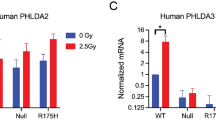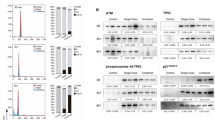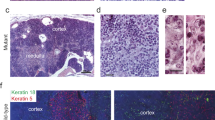Abstract
DNA mismatch repair (MMR) stabilizes the cellular genome. Mice defective in the MMR gene PMS2 are susceptible to spontaneous thymic lymphoma and sarcomas. To determine the sensitivity of PMS2 knockout mice to environmental carcinogens and the protective effect of O6-methylguanine DNA methyltransferase (MGMT), heterozygous PMS2 knockout mice and human MGMT (hMGMT) transgenic mice were mated and the PMS2−/− and PMS2+/+ with or without hMGMT offspring were treated at 5 weeks of age with 50 mg/kg N-methyl-N-nitrosourea (MNU). MNU produces carcinogenic O6-methylguanine (O6-meG) adducts, resulting in thymic lymphoma in mice, which can be prevented in normal mice by overexpression of hMGMT. A significantly higher incidence of thymic lymphomas was observed in MNU-treated PMS2−/− mice, compared to wildtype PMS2+/+ mice (100 vs 52%; P<0.001). The mean latency of lymphomas was also significantly shortened in PMS2−/− mice (81 vs 102 days, P<0.01). Transgenic expression of hMGMT significantly but incompletely blocked MNU lymphomagenesis in PMS2−/− mice. The incidence of lymphomas in PMS2−/−/hMGMT+ mice was reduced to 80% (P<0.01) and mean latency increased to 91 days (P<0.05). Thymic lymphomagenesis was efficiently blocked in PMS2+/+/hMGMT+ mice with rapid repair of O6-meG. Since O6-meG:T mismatches in MMR+ cells may trigger mismatch repair resulting in abortive repair and cell death whereas in the absence of MMR, these mismatches are converted to A:T, we predicted that G to A point mutations in codon 12 of the K-ras gene would occur. In this study, we found G to A point mutations in codon 12 of the K-ras gene in many tumors. Thus, in MMR deficient tissues, methylating agents induce point mutations in cells with a higher rate of cell survival which together are potently carcinogenic in the thymus. These data suggest that PMS2 defective lymphomas may arise by the concerted action of environmental and perhaps endogenous methylation of DNA coupled to genomic instability.
This is a preview of subscription content, access via your institution
Access options
Subscribe to this journal
Receive 50 print issues and online access
$259.00 per year
only $5.18 per issue
Buy this article
- Purchase on Springer Link
- Instant access to full article PDF
Prices may be subject to local taxes which are calculated during checkout




Similar content being viewed by others
Abbreviations
- AGT:
-
O6-alkylguanine DNA-alkyltransferase protein
- hMGMT:
-
human methylguanine DNA-methyltransferase gene
- MMR:
-
mismatch repair
- MNU:
-
N-methyl-N-nitrosourea
References
Allay E, Reese JS, McGuire EA, Koc ON, Sedransk N and Gerson SL. . 1997 Oncogene 15: 2127–2132.
Allay E, Veigel M and Gerson SL. . 1999 Oncogene (in press).
Baker SM, Bronner CE, Zhang L, Plug AW, Robatzek M, Warren G, Elliott EA, Yu J, Ashley T, Arnheim N, Flavell RA and Liskay RM. . 1995 Cell 82: 309–319.
Baker SM, Plug AW, Prolla TA, Bronner CE, Harris AC, Yao X, Christie DM, Monell C, Arnheim N, Bradley A, Ashley T and Liskay RM. . 1996 Nature Genetics 13: 336–342.
Belinsky SA, Devereux TR, Maronpot RR, Stoners G and Anderson MW. . 1989 Cancer Res. 49: 5305–5311.
Carethers JM, Hawn MT, Chauhan DP, Luce MC, Marra G, Koi M and Boland CR. . 1996 J. Clin. Invest. 98: 199–206.
Corominas M, Perucho M, Newcomb EW and Pellicer A. . 1991 Cancer Res. 51: 5129–5133.
Davis TW, Wilson-Van Patten C, Meyers M, Kunugi KA, Cuthill S, Reznikoff C, Garces C, Boland CR, Kinsella TJ, Fishel R and Boothman DA. . 1998 Cancer Res. 58: 767–778.
de Wind N, Dekker M, Berns A, Radman M and te Riele H. . 1995 Cell 82: 321–330.
Dumenco LL, Aarce C, Norton K, Yun J, Wagner T and Gerson SL. . 1991 Cancer Res. 51: 3391–3398.
Dumenco LL, Allay E, Norton K and Gerson SL. . 1993 Science 259: 219–222.
Eadie JS, Conrad M, Toorchen D and Topal MD. . 1984 Nature 308: 201–203.
Ellison KS, Dogliotti E, Connor TD, Basu AK and Essigmann JM. . 1989 Proc. Natl. Acad. Sci. USA 86: 8620–8624.
Fink D, Aebi S and Howell SB. . 1998 Clin. Cancer Res. 4: 1–6.
Galloway SM, Greenwood SK, Hill RB, Bradt CI and Bean CL. . 1995 Mutation Res. 346: 231–245.
Gerson SL, Trey JE, Miller K and Berger N. . 1986 Carcinogenesis 7: 745–749.
Hawn MT, Umar A, Carethers JM, Marra G, Kunkel TA, Boland CR and Koi M. . 1995 Cancer Res. 55: 3721–3725.
Iwakuma T, Sakumi K, Nakatsuru Y, Kawate H, Igarashi H, Shiraishi A, Tsuzuki T, Ishikawa T and Sekihuchi M. . 1997 Carcinogenesis 18: 1631–1635.
Lim IK, Dumenco LL, Yun J, Donovan C, Warman B, Gorodetzkaya N, Wagner TE, Clapp DW, Hansen RW and Gerson SL. . 1990 Cancer Res. 50: 1701–1708.
Lindahl T. . 1982 Annu. Rev. Biochem. 51: 61–87.
Liu L, Allay E, Dumenco LL and Gerson SL. . 1994 Cancer Res. 54: 4648–4652.
Liu L, Markowitz S and Gerson SL. . 1996 Cancer Res. 56: 5375–5379.
Lowsky R, DeCoteau JF, Reitmair AH, Ichinohasama R, Dong WF, Xu Y, Mak TW, Kadin ME and Minden MD. . 1997 Blood 89: 2276–2282.
Matsukuma S, Nakatsuru Y, Nakagawa K, Utakoji T, Sugano H, Kataoka H, Sekiguchi M and Ishikawa T. . 1989 Mutat. Res. 218: 197–206.
Meikrantz W, Bergom MA, Memisoglu A and Samson L. . 1998 Carcinogenesis 19: 369–372.
Modrich P and Lahue R. . 1996 Annu. Rev. Biochem. 65: 101–133.
Nakatsuru Y, Matsukuma S, Sekiguchi M and Ishikawa T. . 1991 Mutat. Res. 254: 225–230.
Nakatsuru Y, Matsukuma S, Nemoto N, Sugano H, Sekiguchi M and Ishikawa T. . 1993 Proc. Natl. Acad. Sci. USA 90: 6468–6472.
Narayanan L, Fritzell JA, Baker SM, Liskay RM and Glazer P. . 1997 Proc. Natl. Acad. Sci. USA 94: 3122–3127.
Newcomb EW, Pellicer A and Cordon-Cardo C. . 1990 Am. J. Pathol. 136: 307–317.
Pegg AE. . 1990 Cancer Res. 50: 6119–6129.
Pegg AE, Dolan ME and Moschel RC. . 1995 Prog. Nucleic Acid Res. Mol. Biol. 51: 167–223.
Prolla AT, Baker SM, Harris AC, Tsao JL, Yao X, Bronner E, Zheng B, Gordon M, Reneker J, Arnheim N, Shibata D, Bradley A and Liskay RM. . 1998 Nature Genetics 18: 276–279.
Qin X, Nakatsuru Y, Kohyama K and Ishikawa T. . 1990 Carcinogenesis 11: 235–238.
Qin X, Zarkovic M, Nakatsuru Y, Arai M, Oda H and Ishikawa T. . 1994 Carcinogenesis 15: 851–855.
Reitmair AH, Schmits R, Ewel A, Bapat B, Redstonm M, Mitri A, Waterhouse P, Mittrucker HW, Wakeman A, Liu B, Thomason A, Griesser H, Gallinger S, Ballhausen WG, Fishel R and Mak TW. . 1995 Nature Genet. 11: 64–70.
Reitmar AH, Redstonm M, Cai JC, Chuang TCY, Bjerknes M, Cheng H, Hay K, Gallinger S, Bapat B and Mak TW. . 1996 Cancer Res. 56: 3842–3849.
Romach E, Moor J, Rummel S and Richie E. . 1994 Carcinogenesis 15: 2275–2280.
Rudiger HW, Schwartz U, Serrand E, Stief M, Krause T, Nowak D, Doerjer G and Lehnert G. . 1989 Cancer Res. 49: 5623–5626.
Sakumar S, Notario V, Martin-Zanca D and Barbacid M. . 1983 Nature 306: 658–661.
Sakumi K, Shiraishi A, Shimizu S, Tsuzuki T, Ishikawa T and Sekiguchi M. . 1997 Cancer Res. 57: 2415–2418.
Strike PW. . 1991 Statistical Methods in Laboratory Medicine. Strike PW (ed.).. The University Press, Cambridge pp. 53–57.
Thomale J, Huh N, Nehls P, Eberle G and Rajewsky MF. . 1990 Proc. Natl. Acad. Sci. USA 87: 9883–9887.
Tszuki T, Sakumi K, Shiraishi A, Kawate H, Igarashi H, Iwakuma T, Tominaga Y, Zhang S, Shimizu S, Ishikawa T, Nakamura K, Nakao K, Katsuki M and Sekiguchi M. . 1996 Carcinogenesis 17: 1215–1220.
Wang Y, You M, Reynolds SH, Stoners G and Anderson MW. . 1990 Cancer Res. 50: 1591–1595.
Zaidi N, Pretlow TP, O'Riordan MA, Dumenco L, Allay E and Gerson SL. . 1995 Carcinogenesis 16: 451–456.
Acknowledgements
We would like to thank Dr RM Liskay, Oregon Health Sciences University, Portland, Oregon, USA, for providing us PMS2 knockout mice and for very helpful comments on this manuscript. This work was supported in part by USPHS Grants P30CA43703, RO1CA63193 and RO1ES06288.
Author information
Authors and Affiliations
Rights and permissions
About this article
Cite this article
Qin, X., Liu, L. & Gerson, S. Mice defective in the DNA mismatch gene PMS2 are hypersensitive to MNU induced thymic lymphoma and are partially protected by transgenic expression of human MGMT. Oncogene 18, 4394–4400 (1999). https://doi.org/10.1038/sj.onc.1202798
Received:
Revised:
Accepted:
Published:
Issue Date:
DOI: https://doi.org/10.1038/sj.onc.1202798
Keywords
This article is cited by
-
Analysis of 100,000 human cancer genomes reveals the landscape of tumor mutational burden
Genome Medicine (2017)
-
Balancing repair and tolerance of DNA damage caused by alkylating agents
Nature Reviews Cancer (2012)
-
Syndrome of Early Onset Colon Cancers, Hematologic Malignancies & Features of Neurofibromatosis in HNPCC Families with Homozygous Mismatch Repair Gene Mutations
Familial Cancer (2005)
-
Lung tumorigenesis associated with erb-B-2 and erb-B-3 overexpression in human erb-B-3 transgenic mice is enhanced by methylnitrosourea
Oncogene (2002)
-
Overexpression of human O6-alkylguanine DNA alkyltransferase (AGT) prevents MNU induced lymphomas in heterozygous p53 deficient mice
Oncogene (2001)



